Dirt Contractors Anaheim
Best Dirt Removal in Anaheim
Receive up to 3 Dirt Hauling quotes for your project today! Compare profiles, reviews, accreditations, portfolio, etc... and choose the best service.

KR Land Development LLC: Land Clearing and Site Prep
516 reviewsOrange, USAbout KR Land Development At KR Land Development, our mission is to transform natural landscapes into safe, sustainable, and accessible spaces. With a deep respect for the environment and a commitment to efficiency, we provide expert land clearing services that pave the way for responsible land development. Our goal is to balance the needs of our clients with the preservation of nature, delivering innovative solutions that create a harmonious coexistence between humanity and the land. We are dedicated to improving the accessibility, safety, and utility of our clients’ properties while minimizing our impact on the environment. By aligning cutting-edge technology with eco-conscious practices, we aim to be leaders in the industry, leaving a legacy of well-cleared land and a healthier planet for future generations. Ready to Get Started On Your Land Clearing Project? We've Got You Covered! If you are looking to get started on your next land clearing project, we are here to help! KR Land Development offers free consultations to every client that is interested in our land clearing or property services. We are licensed & insured, protecting our clients and their property at all times throughout the land clearing process.
- Services
- Why Us?
- Gallery
Get Quote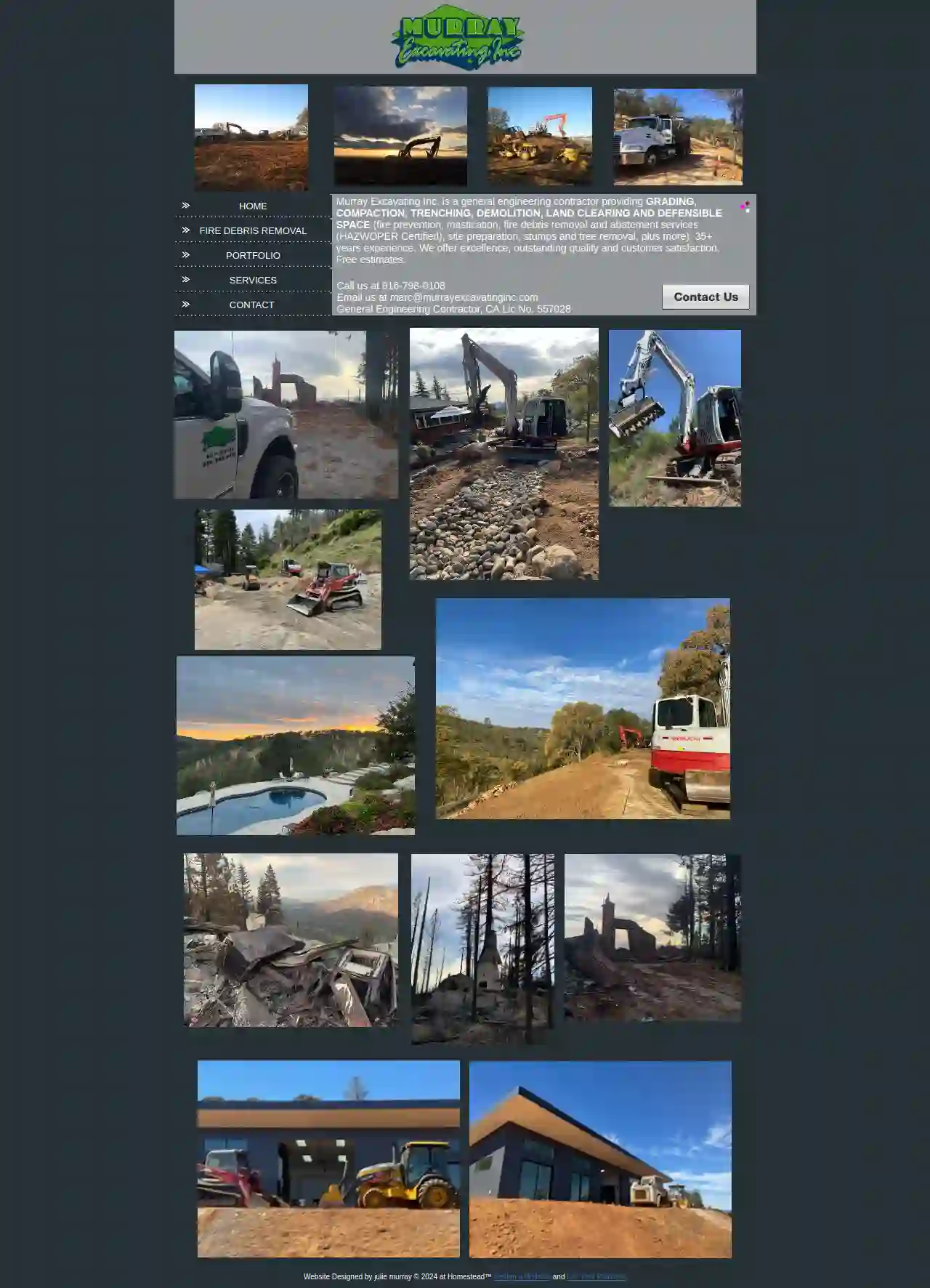
Murray Excavating Inc. Backhoe Service, Excavating and General Engineering Contractor
51 reviewsLatrobe, CA, 95682, USAbout Murray Excavating Inc. Murray Excavating Inc. is a general engineering contractor with over 35 years of experience, specializing in a wide range of services including grading, compaction, trenching, demolition, land clearing, and defensible space preparation. We are committed to providing excellence, outstanding quality, and exceptional customer satisfaction. Our team is HAZWOPER Certified and equipped to handle projects of all sizes, from small residential properties to large-scale commercial developments. We understand the importance of fire safety and have extensive experience in fire debris removal and clean-up. We have worked on major fire events such as the Caldor, Santa Cruz, NAPA, and Paradise Fires, providing comprehensive services that include debris removal, demolition, utility capping, and erosion control. Our goal is to restore your property to a safe and usable condition, while ensuring compliance with all federal and local regulations. Beyond fire-related services, we offer a comprehensive range of solutions for land development and improvement. Our services include brush clearing, mastication, fuel reduction, and land reclamation for various purposes such as recreation, grazing, access, and new construction. We are dedicated to helping you create a safe and sustainable environment for your property. Our team is equipped with a wide range of heavy machinery, including skip loaders, backhoes, excavators, masticators, mowers, dozers, compactors, and 10-wheelers, allowing us to handle any project efficiently and effectively. We are committed to providing our clients with the highest level of service and expertise, ensuring their complete satisfaction.
- Services
- Why Us?
- Gallery
Get Quote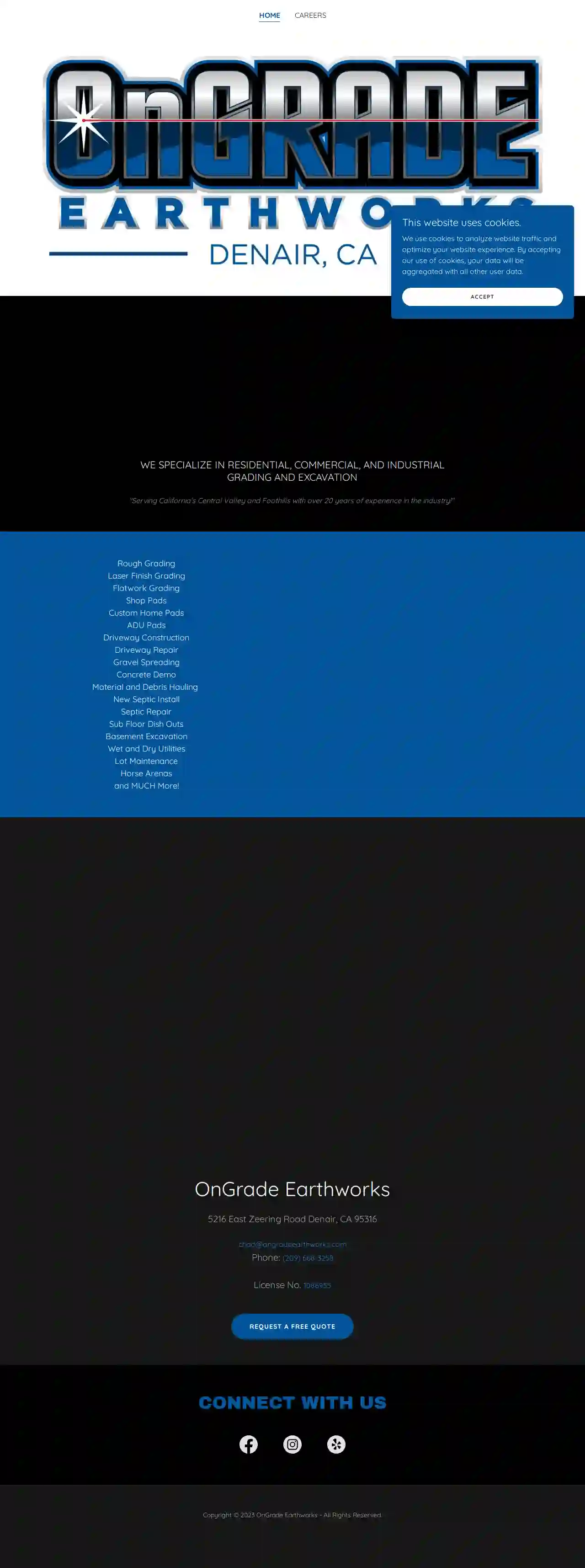
OnGrade Earthworks
15216 East Zeering Road, Denair, 95316, USOnGrade Earthworks We specialize in residential, commercial, and industrial grading and excavation. Serving California's Central Valley and Foothills with over 20 years of experience in the industry! Rough Grading We provide expert rough grading services for a variety of projects. Laser Finish Grading Our laser finish grading services ensure precise and accurate results. Flatwork Grading We offer flatwork grading for driveways, patios, and other areas. Shop Pads We build durable and reliable shop pads for your business. Custom Home Pads We create custom home pads to meet your specific needs. ADU Pads We specialize in building ADU pads for your property. Driveway Construction We construct durable and attractive driveways for your home or business. Driveway Repair We repair damaged driveways to restore their functionality and appearance. Gravel Spreading We provide gravel spreading services for a variety of applications. Concrete Demo We offer professional concrete demolition services. Material and Debris Hauling We handle all your material and debris hauling needs. New Septic Install We install new septic systems for your property. Septic Repair We repair existing septic systems to ensure proper functionality. Sub Floor Dish Outs We provide sub floor dish out services for your project. Basement Excavation We offer professional basement excavation services. Wet and Dry Utilities We handle all your wet and dry utility needs. Lot Maintenance We provide lot maintenance services to keep your property looking its best. Horse Arenas We build and maintain horse arenas for your equestrian needs. Sand We provide sand delivery and spreading services. AND MUCH MORE! We offer a wide range of grading and excavation services to meet your needs.
- Services
- Why Us?
- Gallery
Get Quote
Excavating Contractor Los Angeles
59 reviewsLos Angeles, USWelcome to Bobcat Excavating Services Los Angeles As an excavation services and bobcat services provider in Los Angeles, we at BSLA – Bobcat Services Los Angeles help our clients with any processes that involve removal of earth from the ground, transfer of earth from one site to another, backfilling of earth to previously excavated spaces, and modification of sites to suite various clients’ needs. Are you building or remodeling your outdoor space? Chances are that we can be of help. If you searched for “excavators near me” for you got to the right place! We are experts when it comes to excavation, bobcat services, compacting, filling and grading. We work on residential sites, commercial sites, and industrial locations. We are licensed and insured and all our machine operators are vigorously skilled in handling our heavy machinery and providing precision results.
- Services
- Why Us?
- Gallery
Get Quote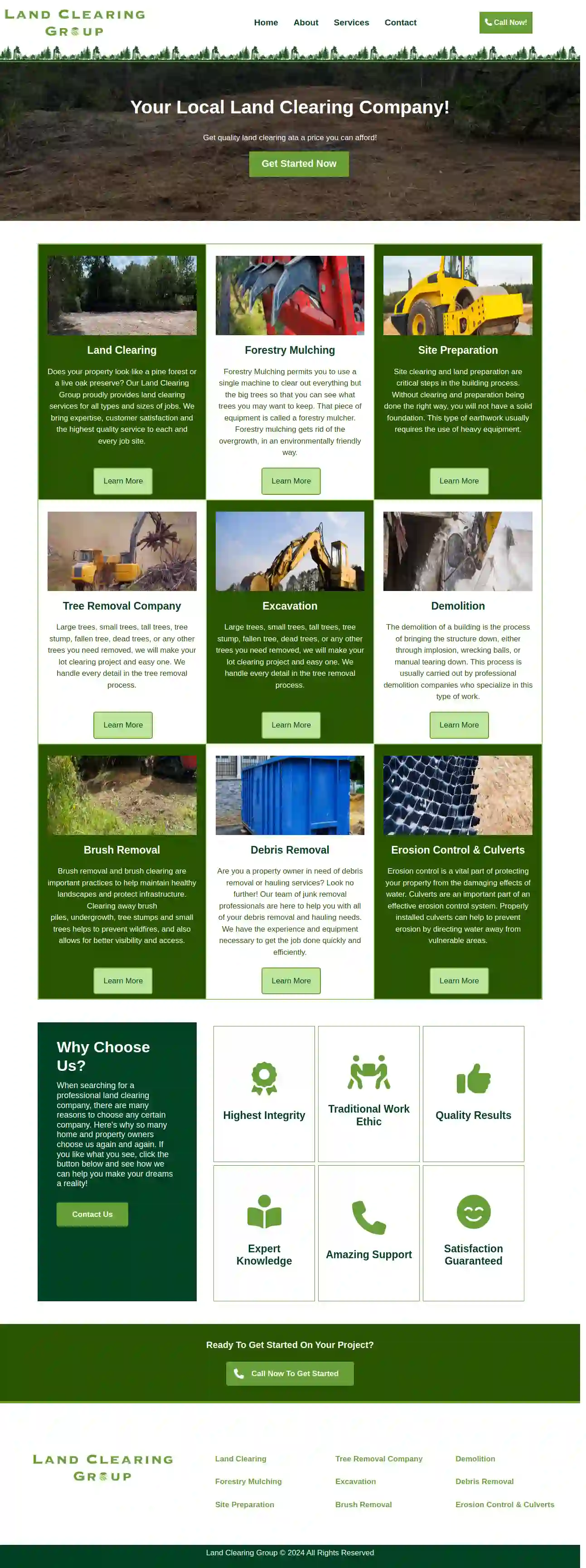
Land Clearing Group
55 reviewsOrange, USAbout The Land Clearing Group We help homeowners and businesses clear and prepare their property for the next phase of their project. Whether you need simple brush clearing or a total clear and site prep, we are here to help. Land Clearing Group is more than just a single company, we are composed of a large team of industry professionals that can handle any land clearing project; no matter the task. Our team of pros gives property owners a combined 50+ years of experience. We have worked in land projects across the state of Florida, Land Clearing Central Florida is quickly become the industry leader in customer satisfaction.Understand that this is our top priority on all land clearing solutions. Operating with such high corporate standards is not an easy task to achieve and can be solely attributed to the multiple professionals involved. Since the start of the company, we have operated on 3 principles which are visible on every project we do: We love this stuff! We will show up at each job: on time, ready to work and have fun. There will be crystal clear communication with the property owners at all times: before, during and after all projects. Your property will always be treated the same way we would treat our own property.
- Services
- Why Us?
- Gallery
Get Quote
Wipf Excavating LLC
56 reviews1695 15th St NW, Huron, 57350, USOur Company at a Glance WIPF EXCAVATING LLC is a family owned and operated business ready to serve you. Started in 2015, Wipf Excavating LLC has grown into a very experienced and high quality company that exceeds the expectations of customers. We are based out of the Huron SD area, but do a lot of traveling across SD. Our company is founded on faith in God, trust in each other, great relationships with customers and fellow contractors, and joy in all that we do. Our goal is for you to be a happy, life-long customer.
- Services
- Why Us?
- Gallery
Get Quote
JPS General Construction
53 reviews123 Main Street, Anytown, 12345, USAbout JPS General Construction JPS General Construction is a family-owned and operated business with over 20 years of experience in the construction industry. We are committed to providing our clients with high-quality workmanship, exceptional customer service, and competitive pricing. We specialize in a wide range of construction services, including: Residential construction Commercial construction Remodeling Additions Roofing Siding Windows and doors Decks and patios Concrete work And more! We are fully licensed, insured, and bonded, and we are committed to providing our clients with peace of mind. We work closely with our clients to ensure that their projects are completed on time and within budget. We are also dedicated to providing our clients with a positive and stress-free construction experience. If you are looking for a reliable and experienced construction company, look no further than JPS General Construction. We are committed to providing our clients with the highest quality construction services available.
- Services
- Why Us?
Get Quote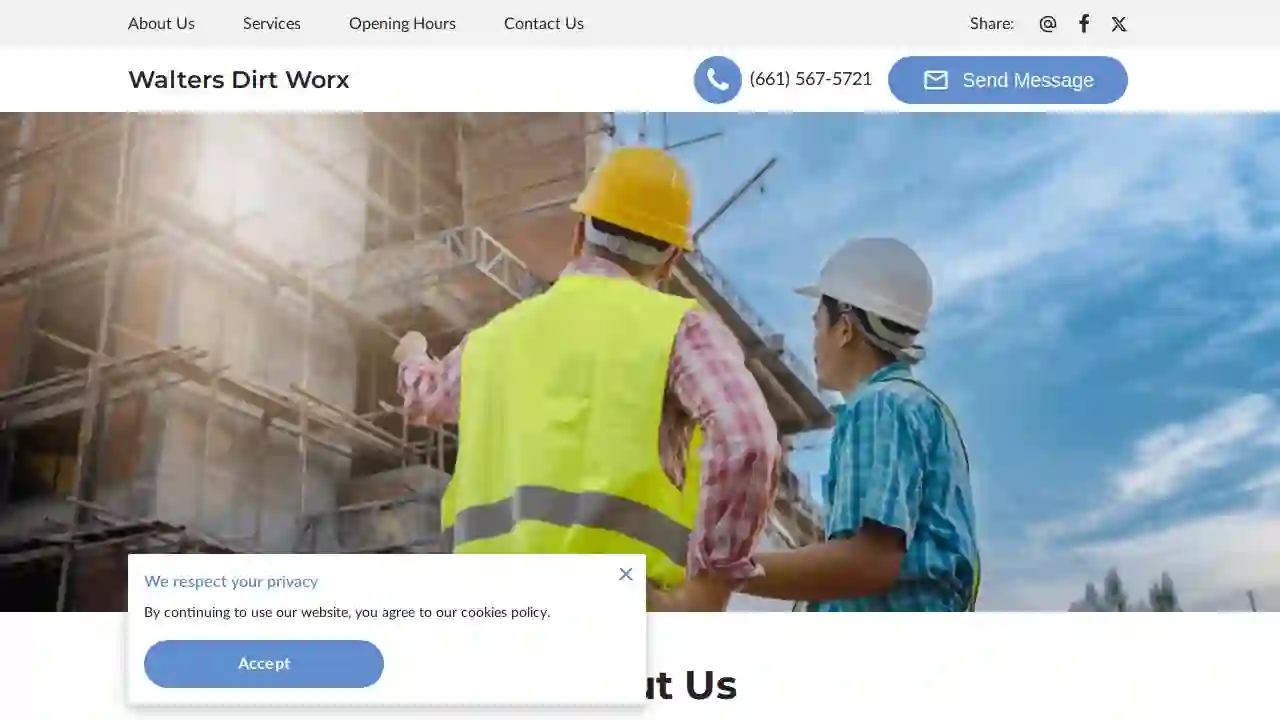
Walters Dirt Worx
1Bakersfield, California, USAbout Us Here at Walters Dirt Worx we offer an exceptional range of construction services in the greater Bakersfield area. From concrete foundation work to excavation, brickwork, and architectural advice, our experienced builders understand the best solutions that work for you. We provide any heavy equipment required work with outstanding results and unbeatable pricing. We’re all dedicated to our roles and work hard to get the job done. Give us a call at +16615675721 so we can discuss any of your construction needs. We always use the highest quality materials during the construction of your outdoor space and our expert designers utilise industry-leading tools. This mix of top equipment and unmatched skill has allowed us to succeed by supplying our clients with services they won’t forget. Not convinced? Think we’re all talk? Read our reviews and get in touch to see what we can deliver. You will not be disappointed. Are you putting together a blueprint for a property or building? If you are, we can deliver expert excavation services to prepare a new build for the foundations and basis of your construction. We understand the demands that are placed on you, so work with your goals in mind to prepare and excavate the land by the most efficient means possible, using a combination of manpower and highly technical heavy-duty vehicles.
- Services
- Why Us?
Get Quote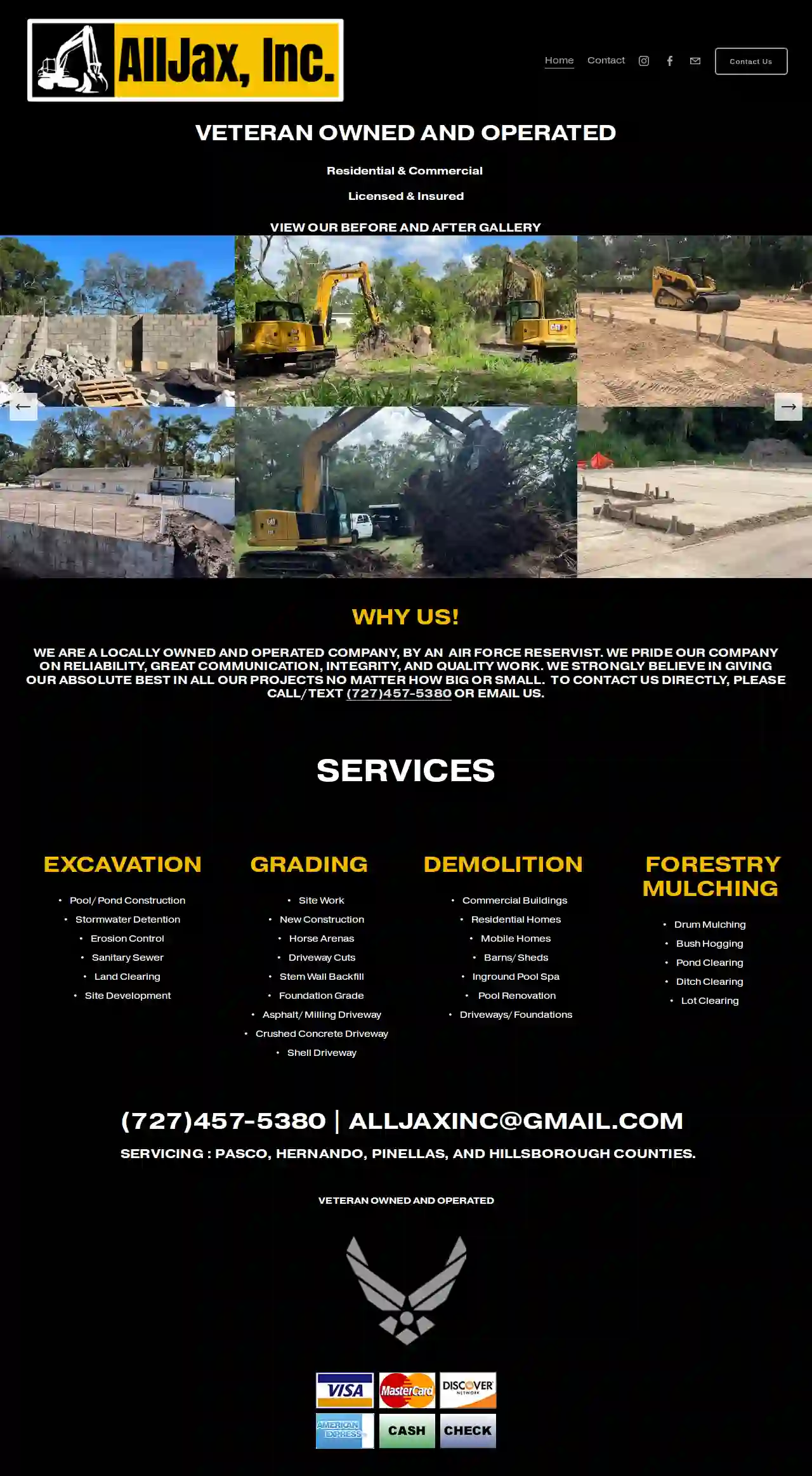
AllJax Inc Excavation, Forestry Mulching & Pond Clearing
4.935 reviewsDavis, USAllJaxInc is a locally owned and operated company, run by an Air Force reservist. We take pride in our reliability, excellent communication, integrity, and high-quality work. We are committed to delivering our best on every project, big or small. We are dedicated to providing exceptional service to our clients in Pasco, Hernando, Pinellas, and Hillsborough Counties. Our team is experienced in a wide range of services, including excavation, pool and pond construction, stormwater detention, erosion control, sanitary sewer, land clearing, site development, forestry, demolition, and grading. We are fully licensed and insured, and we are proud to be a Veteran Owned and Operated business. To contact us directly, please call/text (727)457-5380 or Email Us.
- Services
- Why Us?
- Gallery
Get Quote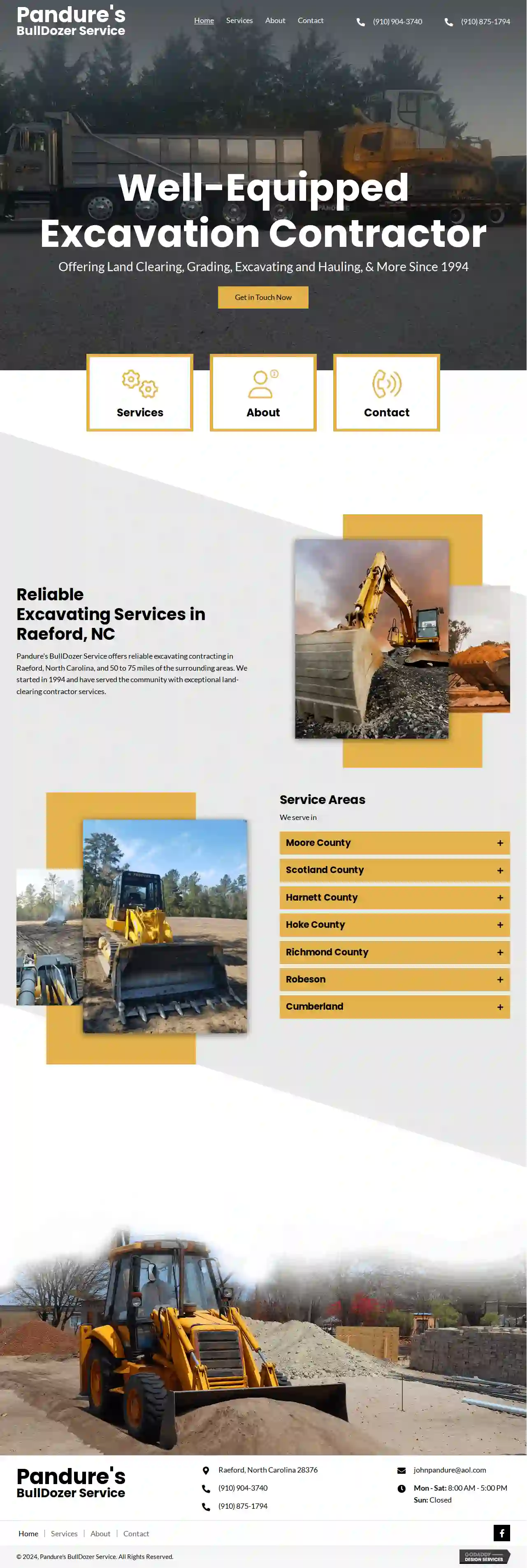
Pandure's BullDozer Service
58 reviewsRaeford, 28376, USPandure's BullDozer Service: Your Trusted Excavation Partner Pandure's BullDozer Service is a family-owned and operated excavation and land clearing specialist based in Raeford, North Carolina. We've been serving the community since 1994, providing reliable and professional services for all your land clearing, grading, excavating, and hauling needs. Our team is comprised of skilled professionals with decades of experience in the industry. We are committed to delivering seamless, safe, and trustworthy services, always prioritizing transparency and working within your budget. Whether you need land leveling for a new construction project, demolition work to clear an existing structure, or expert grading and excavating services, we have the expertise and equipment to handle it all. We are proud to serve a wide range of clients, including builders, developers, and homeowners in Raeford and the surrounding areas. At Pandure's BullDozer Service, we are dedicated to providing exceptional customer service and exceeding your expectations. Contact us today to discuss your project and let us help you bring your vision to life.
- Services
- Why Us?
- Testimonials
- Gallery
Get Quote
Over 3,943+ Excavation Businesses in our network
Our excavation providers operate in Anaheim and surrounding areas!
ExcavationHQ has curated and vetted Top Excavation Contractors in and around Anaheim. Find the most trustworthy contractor today.
Frequently Asked Questions About Dirt Contractors
- Plant Selection: Understanding your soil's pH and nutrient levels helps you choose plants that will thrive in those conditions.
- Fertilizer Recommendations: Soil tests reveal nutrient deficiencies, allowing you to apply appropriate fertilizers to meet plant needs.
- Soil Amendments: Identify soil imbalances, such as compaction or high clay content, and recommend amendments to improve soil structure and drainage.
- Construction Projects: Assess soil bearing capacity and other properties to ensure the stability and safety of foundations and other structures.
- Environmental Assessments: Detect potential soil contamination and determine the need for remediation.
- Environmental Site Assessment: Hire a qualified environmental consultant to conduct a Phase I Environmental Site Assessment (ESA). This involves reviewing historical records, conducting site reconnaissance, and interviewing relevant parties to identify potential environmental concerns.
- Soil Sampling and Testing: If the ESA indicates potential contamination, soil samples will be collected and analyzed in a laboratory for the presence of specific contaminants, such as heavy metals, pesticides, or petroleum products.
- Excavators: Versatile machines with a digging arm and bucket, used for excavation, trenching, loading trucks, and demolition.
- Bulldozers: Heavy machines with a large blade at the front, used for pushing and moving dirt, clearing land, and grading.
- Skid Steers: Compact, versatile machines with various attachments, including buckets, forks, and augers, used for digging, loading, grading, and more.
- Dump Trucks: Heavy-duty trucks designed for hauling dirt, gravel, and other bulk materials. Sizes vary based on carrying capacity.
- Graders: Machines with a long blade used for precise leveling and shaping of land surfaces, often used for road construction and site preparation.
- Compactors: Equipment used to compress soil, including plate compactors, rollers, and vibratory tampers, essential for achieving soil stability.
- Clear the Area: Remove any obstacles, such as furniture, toys, or landscaping features, from the designated delivery zone.
- Mark Utilities: Contact your local utility companies to have underground utilities, such as water lines, gas lines, or electrical cables, marked to prevent accidental damage during delivery.
- Protect Existing Landscaping: Cover or move any valuable plants, shrubs, or trees that might be affected by the dirt delivery.
- Provide Access: Ensure the delivery truck has clear access to the delivery zone, including wide enough gates or driveways.
- Communicate with the Contractor: Discuss any specific instructions or concerns you have with the dirt contractor before delivery day.
What is a soil test, and why is it important?
How do I know if the dirt I need is contaminated?
What are some common dirt contracting equipment?
How do I prepare my yard for dirt delivery?
What is a soil test, and why is it important?
- Plant Selection: Understanding your soil's pH and nutrient levels helps you choose plants that will thrive in those conditions.
- Fertilizer Recommendations: Soil tests reveal nutrient deficiencies, allowing you to apply appropriate fertilizers to meet plant needs.
- Soil Amendments: Identify soil imbalances, such as compaction or high clay content, and recommend amendments to improve soil structure and drainage.
- Construction Projects: Assess soil bearing capacity and other properties to ensure the stability and safety of foundations and other structures.
- Environmental Assessments: Detect potential soil contamination and determine the need for remediation.
How do I know if the dirt I need is contaminated?
- Environmental Site Assessment: Hire a qualified environmental consultant to conduct a Phase I Environmental Site Assessment (ESA). This involves reviewing historical records, conducting site reconnaissance, and interviewing relevant parties to identify potential environmental concerns.
- Soil Sampling and Testing: If the ESA indicates potential contamination, soil samples will be collected and analyzed in a laboratory for the presence of specific contaminants, such as heavy metals, pesticides, or petroleum products.
What are some common dirt contracting equipment?
- Excavators: Versatile machines with a digging arm and bucket, used for excavation, trenching, loading trucks, and demolition.
- Bulldozers: Heavy machines with a large blade at the front, used for pushing and moving dirt, clearing land, and grading.
- Skid Steers: Compact, versatile machines with various attachments, including buckets, forks, and augers, used for digging, loading, grading, and more.
- Dump Trucks: Heavy-duty trucks designed for hauling dirt, gravel, and other bulk materials. Sizes vary based on carrying capacity.
- Graders: Machines with a long blade used for precise leveling and shaping of land surfaces, often used for road construction and site preparation.
- Compactors: Equipment used to compress soil, including plate compactors, rollers, and vibratory tampers, essential for achieving soil stability.
How do I prepare my yard for dirt delivery?
- Clear the Area: Remove any obstacles, such as furniture, toys, or landscaping features, from the designated delivery zone.
- Mark Utilities: Contact your local utility companies to have underground utilities, such as water lines, gas lines, or electrical cables, marked to prevent accidental damage during delivery.
- Protect Existing Landscaping: Cover or move any valuable plants, shrubs, or trees that might be affected by the dirt delivery.
- Provide Access: Ensure the delivery truck has clear access to the delivery zone, including wide enough gates or driveways.
- Communicate with the Contractor: Discuss any specific instructions or concerns you have with the dirt contractor before delivery day.